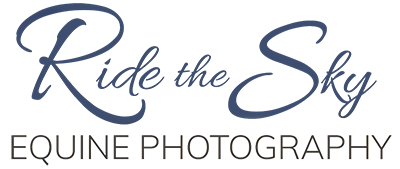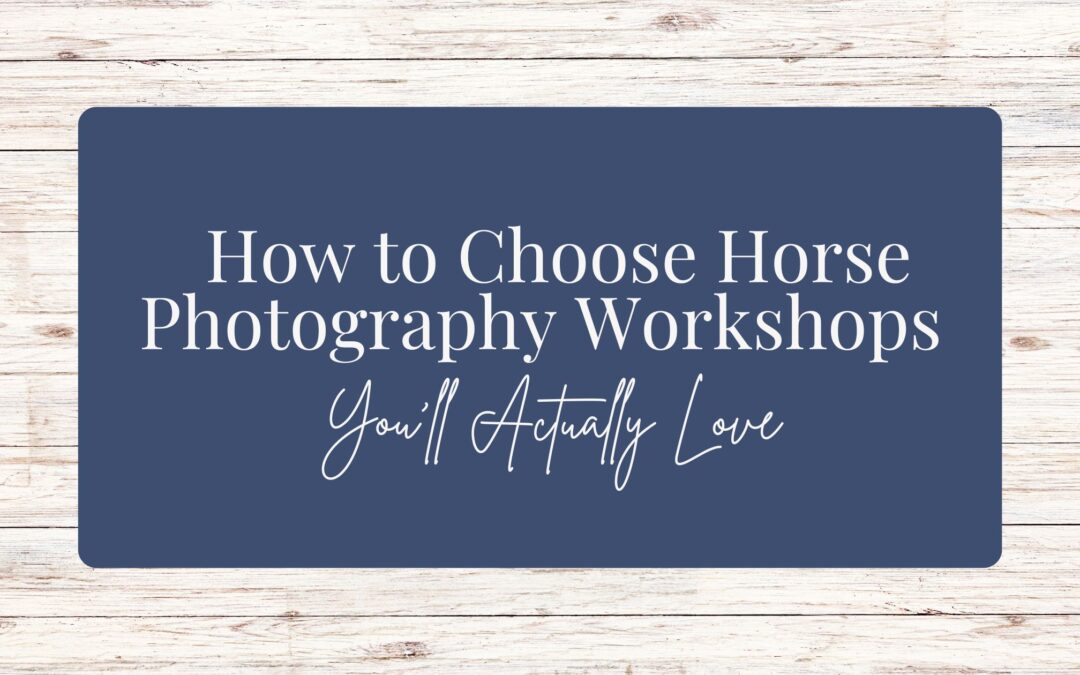So you’re dreaming of starting or growing your horse photography business. First off, love that for you. Second, you’ve probably thought about attending a horse photography workshop or tour.
But, here’s the thing: not all workshops are created equal, and diving into the world of horse photography workshops can feel like stepping into a maze.
Is it a workshop? A tour?
A social experiment designed to test your patience?
Let’s break it down so you don’t accidentally book something that leaves you saying, “What was I thinking?” The more you know, the less money, time, and dare I say, brainpower you waste.
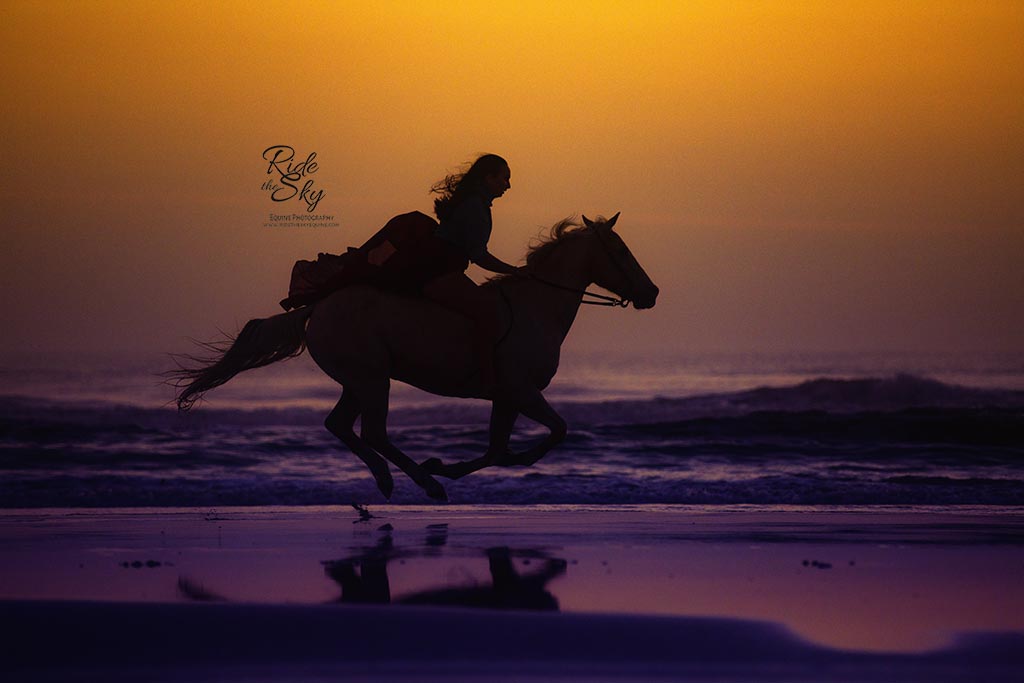
Workshop vs. Tour: Know the Difference Before You Book
Let’s clear this up right now because they’re not the same thing, people.
Before we dive in, let’s clarify the key difference between a horse photography workshop and a horse photography tour because, they’re not the same thing—despite the fact that some workshop leaders may use the words interchangeably.
Horse Photography Workshop
- Subjects Provided: Yep, we’ve got you.
- Locations Provided: Absolutely.
- Education Included: Yes, you’re here to learn, not just take pictures.
Workshops are the sweet spot for newer photographers (or anyone who doesn’t have their camera’s manual memorized). Expect guidance, tips, and someone to tell you when you’ve accidentally left your lens cap on.
Horse Photography Tour
- Subjects Provided: Yes.
- Locations Provided: Also yes.
- Education Included: Checks notes… still no.You’re on your own, friend.
Tours cater to more seasoned equine photographers who know their stuff and just want gorgeous scenes and amazing horses without the teaching element.
Knowing the difference can save you time, money, and a boatload of disappointment.
Workshop:
Subjects provided
Locations provided
Education provided
Tour:
Subjects provided
Locations provided
Education NOT provided
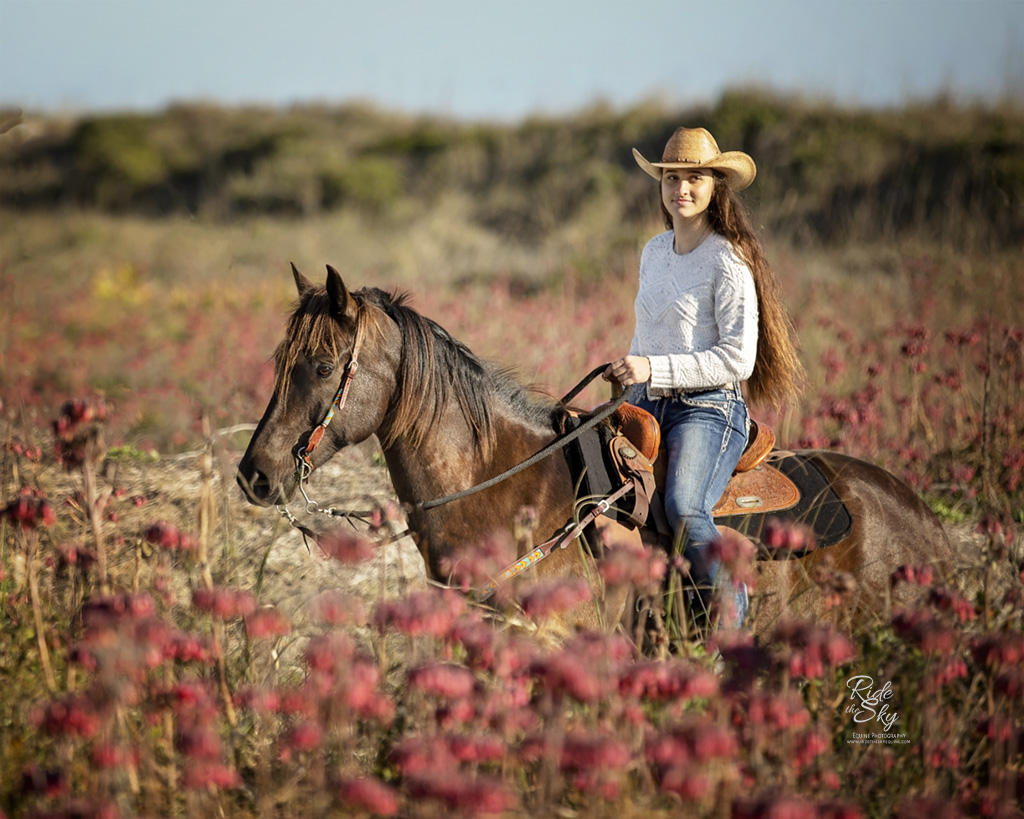
Key Factors When Choosing a Horse Photography Workshop
Because let’s be real, no one wants to waste their money on something that turns out to be the absolute wrong fit for them.
Budget: What’s the Damage?
Let’s be real: workshops aren’t cheap. They can range from a few hundred dollars to several thousand, depending on the length, location, and what’s included. Before you hit that “book now” button, get clear on the total cost.
- Travel Costs: Flights, gas, hotel stays—factor it all in.
- Meals: Some workshops include meals, while others leave you fending for yourself. Know what you’re signing up for.
- Extra Fees: Does the workshop cover permits, props, or other essentials, or will you need to shell out more money on-site?
Pro tip: Ask the host for a detailed breakdown of what’s included. Surprises are great for birthdays, not for your budget.
Time Commitment: Do You Have It?
Workshops can last anywhere from a day to several weeks. If you’re juggling a job, family, or other commitments, make sure the workshop’s schedule aligns with your availability.
- Weekend Warriors: One-day or weekend workshops are great if you’re short on time.
- Extended Adventures: Multi-day or overseas workshops require more planning but offer more immersive experiences.
And don’t forget to factor in travel time. If the workshop is on the other side of the country, you’ll need extra days for getting there and back.
Does It Align With Your Interests?
Not all horse photography is created equal. Think about what excites you:
- Action Shots: Rodeos, jumping events, or horses in motion.
- Portraits: Intimate moments between horse and owner.
- Wild Horses: Locations like Sable Island or the American West.
Choose a workshop that aligns with your passion. And hey, if you’re not sure what you like, workshops can also help you figure that out. Sometimes, discovering what you don’t enjoy is just as valuable. Seriously.
I once flew halfway across the country for a three-day workshop to discover that I absolutely would lose my mind if I had to photograph that style of horse photography. I was ready to nope on out of there after the first day but I stuck it out. Sometimes you have to try something to know it’s not the right fit for you!
Will It Meet Your Needs?
Be honest about where you are in your photography journey. If you’re new, look for workshops that offer:
- Small group sizes for personalized attention.
- Hands-on instruction for using your camera settings.
- Guidance on posing and composition.
For more advanced photographers, consider workshops that focus on:
- Portfolio building with high-quality subjects and locations.
- Specialized techniques, like shooting in low light or capturing motion.
- Business tips for marketing and client management.
Knowing what you need will help you avoid wasting time (and money) on a workshop that doesn’t deliver.
Evaluating the Host
Do Your Research
Not all workshop hosts are created equal. Before you commit, do a deep dive:
- Portfolio: Do you admire their work? If not, why learn from them?
- Testimonials: What do past attendees say about their experience?
- Social Media: Check their social media presence to see if their personality and teaching style resonate with you.
Ask Questions
Don’t be afraid to reach out to the host. Ask about:
- The student-to-instructor ratio.
- What a typical day looks like.
- Any additional costs or requirements.
A good host will happily answer your questions. If they’re cagey or vague, big nope vibes. Huge
Evaluate the Host
Review their Portfolio
Check out their Website
Peruse their Social Media
Read some Testimonials
interact with the Host
Ask for a Reference List
Email Questions
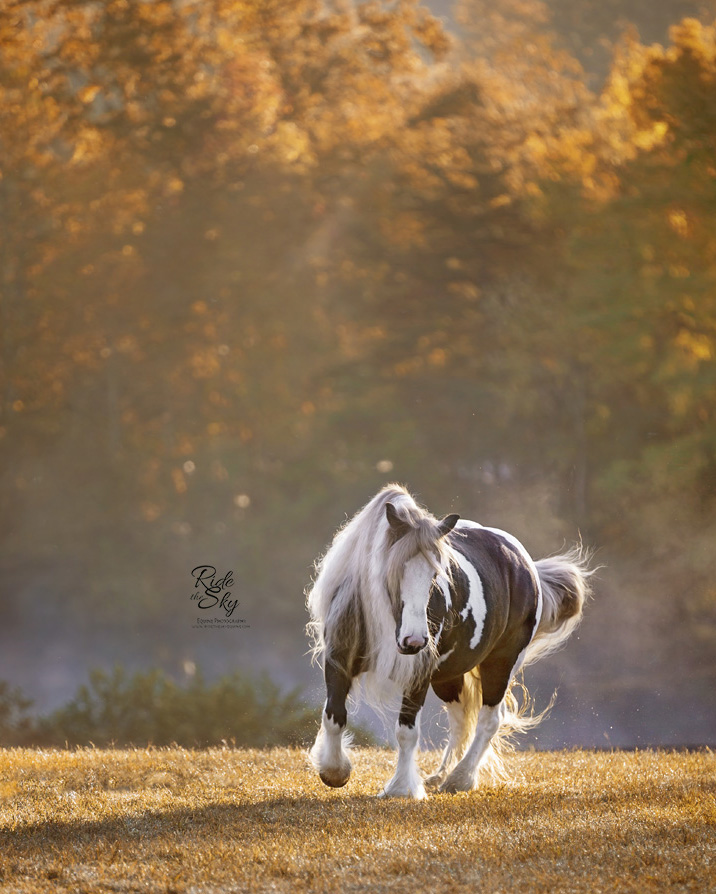
Additional Workshop Considerations
Shooting Opportunities
Find out how much time you’ll actually spend shooting. Some workshops pack in multiple sessions a day, while others may have long breaks. Make sure the schedule aligns with your expectations.
What’s Included?
Does the workshop fee cover meals, lodging, or transportation? Knowing what’s included will help you budget better. Also, check if they offer group discounts or Facebook groups for attendees to connect beforehand.
Value-Added Instruction
Look for workshops that go beyond just shooting. Bonus points for those offering:
- Editing tutorials.
- Business and marketing advice.
- Networking opportunities with industry pros.
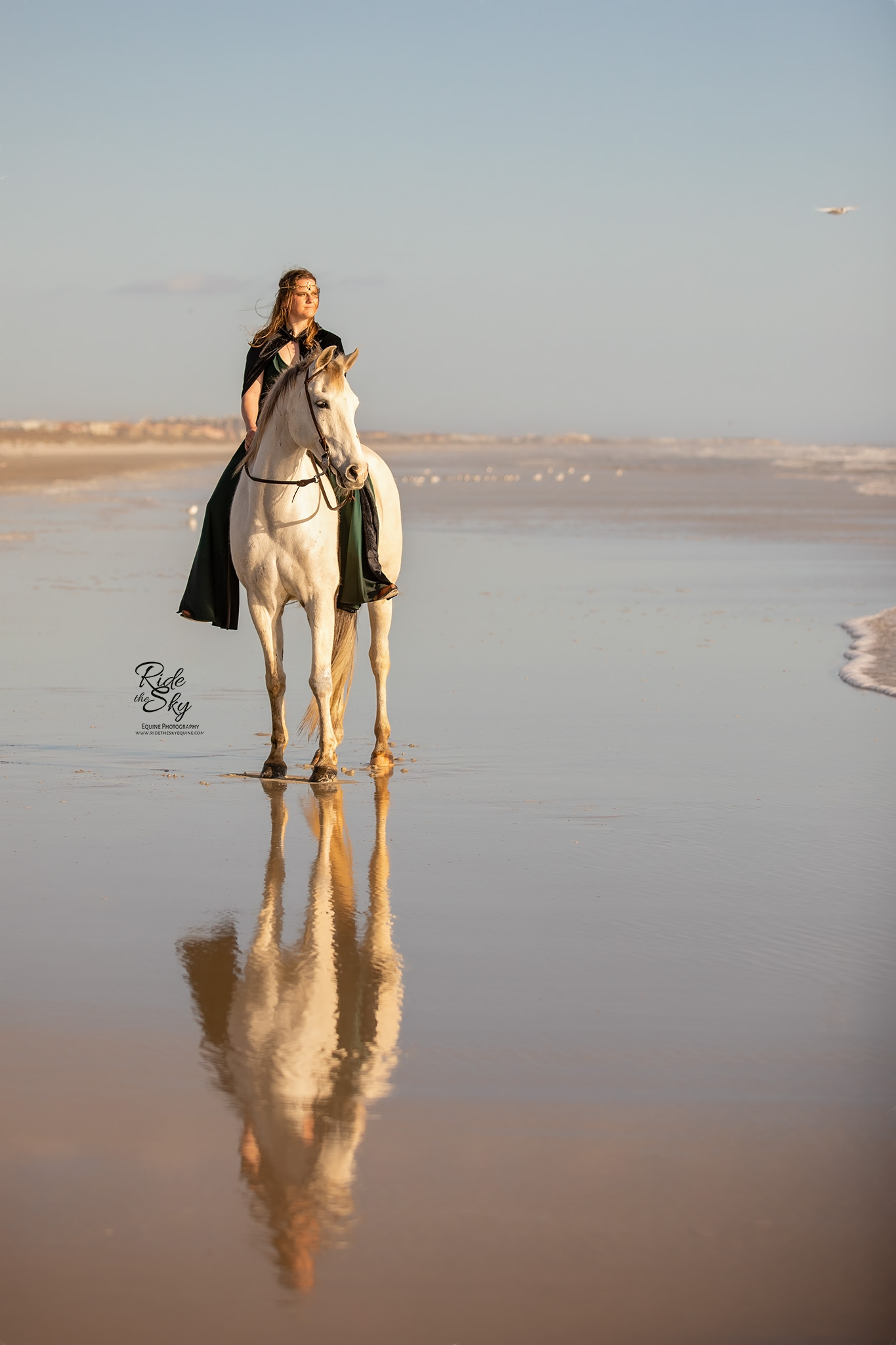
Read the Fine Print (Seriously)
Depending on the workshop, you will have to sign a variety of paperwork prior to the event. This might include things like:
Release of Liability
The workshop host, the venue or facility, and in some cases, the state may require a release of liability while you are participating in the event. Because yes, horses are large and unpredictable. Know what you’re signing.
Model Releases
Planning to sell your images? You’ll need model releases for that. Make sure the workshop includes them.
Contracts
Read them. Twice.
And, then maybe even a third time…out loud.
I know, you’re thinking you’re being ridiculous, Betsy, it’s just standard boilerplate. But… what if it’s not?
It’s very common for workshop hosts to have something in the contract that allows them to post behind-the-scenes pictures on their website or social media that might include you. That’s not a big deal…unless you are in witness protection.
But you need to be aware of any promises made on your behalf through the contract.
For example, has the workshop host promised the models that the attendees would do something? A friend of mine attended a workshop once where the workshop host promised the models that they would receive 10 images from each attendee within 2 weeks of the event. This wasn’t told to the attendees, it was in their contract. Imagine their surprise.
A contract might also restrict what you can do with your images taken at the event. For example, if you wish to sell your images as prints but the contract restricts you from doing it. Or, you want to submit an image to a magazine but can’t because the contract restricts that.
Be sure you know what’s expected of you and what you can do with your images post-workshop. And, most importantly, that you are ok with it.
Final Thoughts: Make the Most of Your Workshop
Choosing the right horse photography workshop isn’t rocket science, but it does take some effort. Do your homework, ask questions, and pick something that excites you.
Want to evaluate workshops like a pro? Download my free guide to evaluating horse photography workshops.
Not ready to dive in just yet? Join the Ride the Sky Herd and get tips, tricks, and snarky wisdom delivered straight to your inbox.
Betsy Bird, Cr. Photog., CPP, of Ride the Sky Equine Photography spends her days doing insane things to make animals look at her. Clearly, she’s desperate for attention. Outside of acting like a total goofball, she invests in growing her business, mentoring photographers, dealing with her teenagers' angst, and hanging with Nitro, the best dog ever. She also tries to spend some time educating and entertaining aspiring photographers by teaching and blogging about whatever catches her fancy at the moment.
Betsy has earned her Photographic Craftsman degree from the Professional Photographers of America (PPA) which honors photographers who contribute to the photographic industry through speaking, mentoring, and publishing. Betsy is also a Certified Professional Photographer (CPP) with PPA. The CPP designation is held by fewer than 2,500 photographers nationwide and is a hallmark of consistency, technical skill, artistry, and professionalism.
Additionally, she serves on the Board of Directors for the Professional Photographers of East Tennessee (PPETN) and the Tennessee Professional Photographers Association (TNPPA). She is also a professional member of the Equine Photographers Network (EPN).
Betsy's award-winning work has been featured in a variety of publications and is found throughout homes and stables in the United States. She is also the co-author of the book, Equine & Equestrian Photography Poses that Sell: The Ultimate Guide to Posing Horses & Humans. She has also been featured on Scenic Trend, the Profitable Photographer Podcast, The Business Animal Podcast, Chatter Magazine, Cowgirls with Cameras Podcast, the Chattanooga Times Free Press, the Chattanoogan, and the Focal Points Podcast to name a few.
Ride the Sky Equine Photography is based in Chattanooga, TN, Ride the Sky Equine Photography works on location in Tennessee, North Georgia, and beyond. With a strong background in entrepreneurship, brand building, goal setting, time management, and business workflows, Betsy is an expert in her field (which isn’t that surprising given how much time she actually spends outstanding in a field...get it?)
